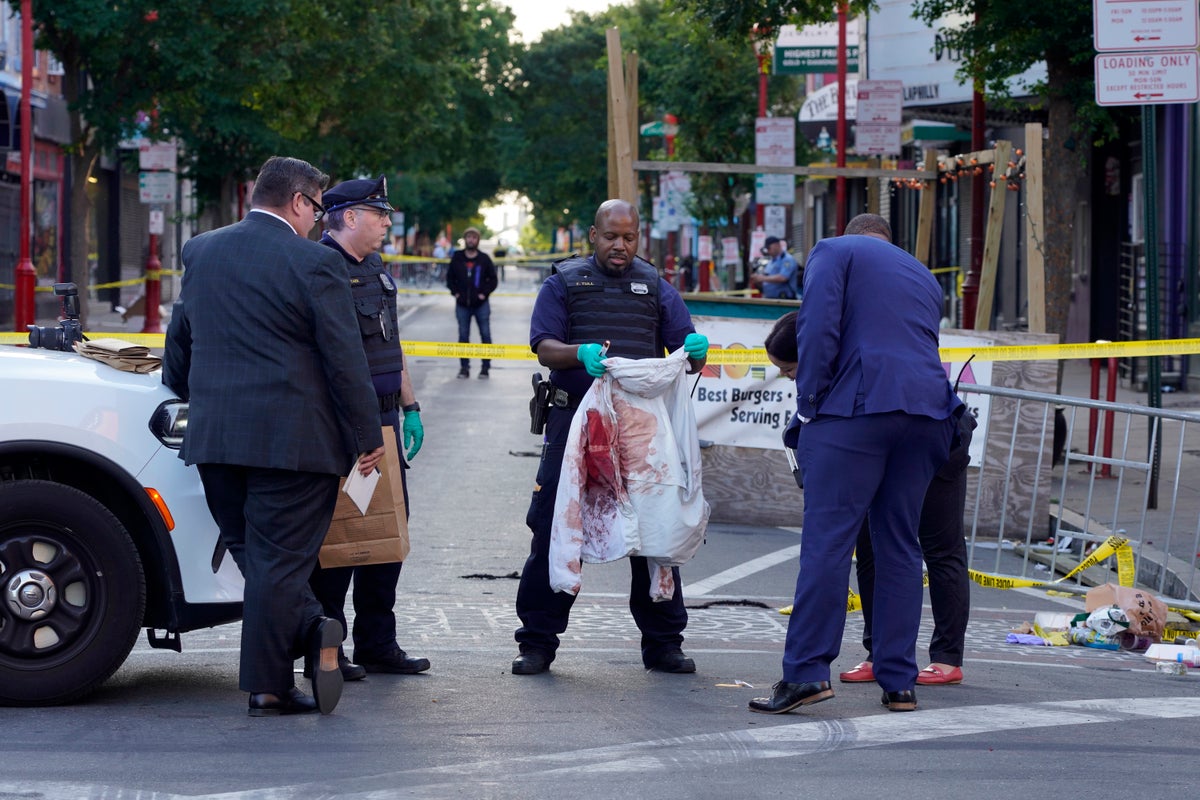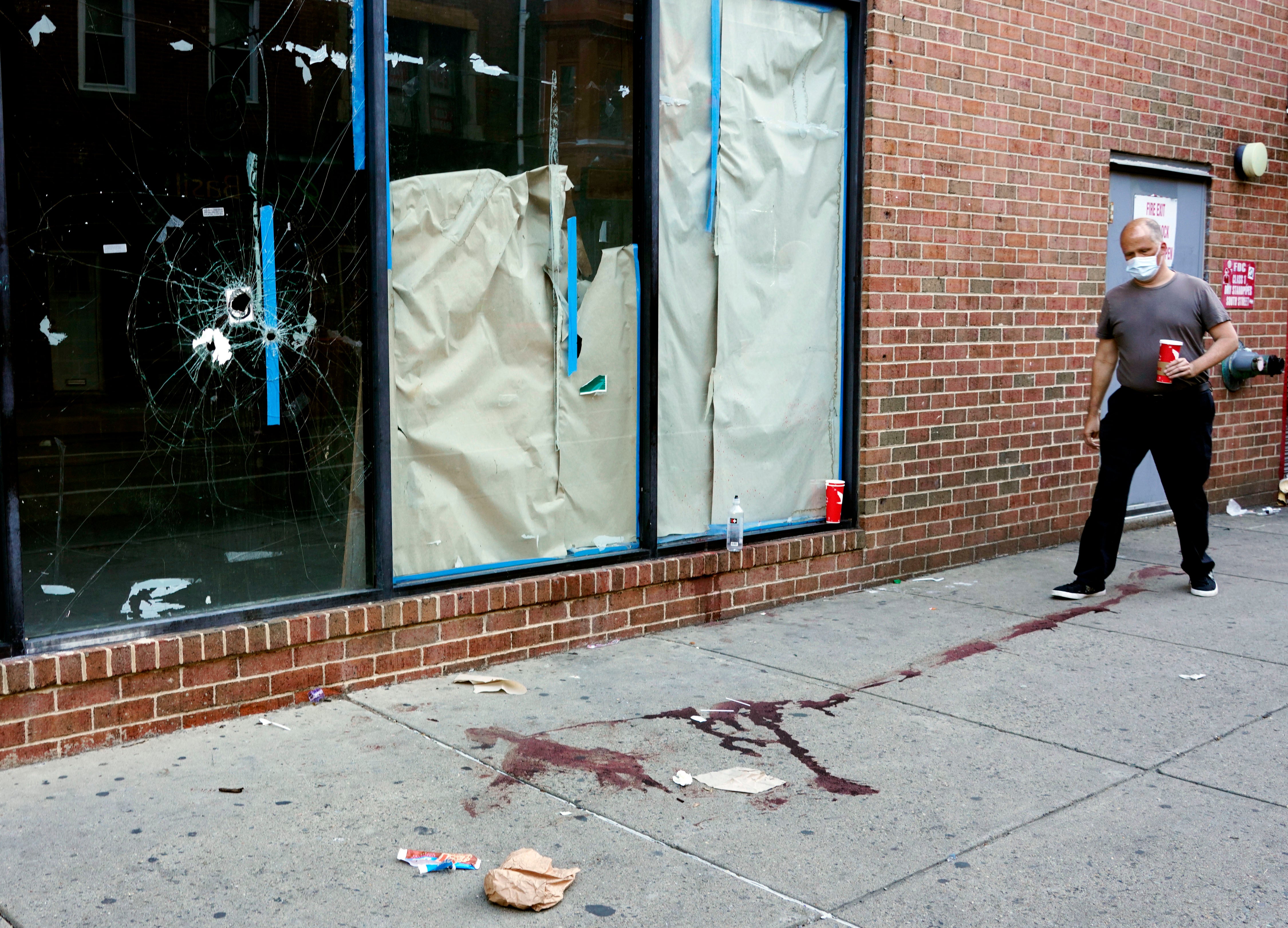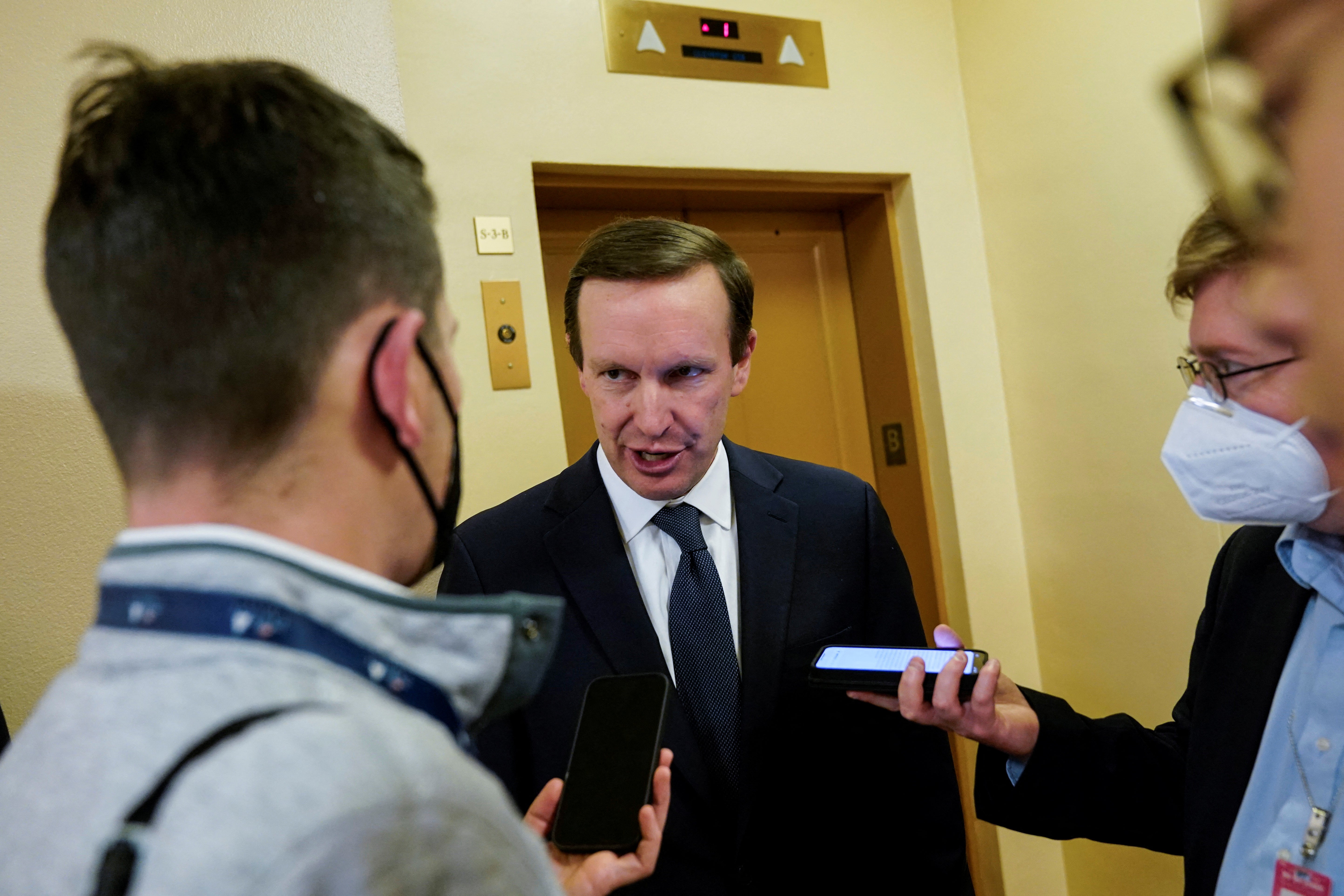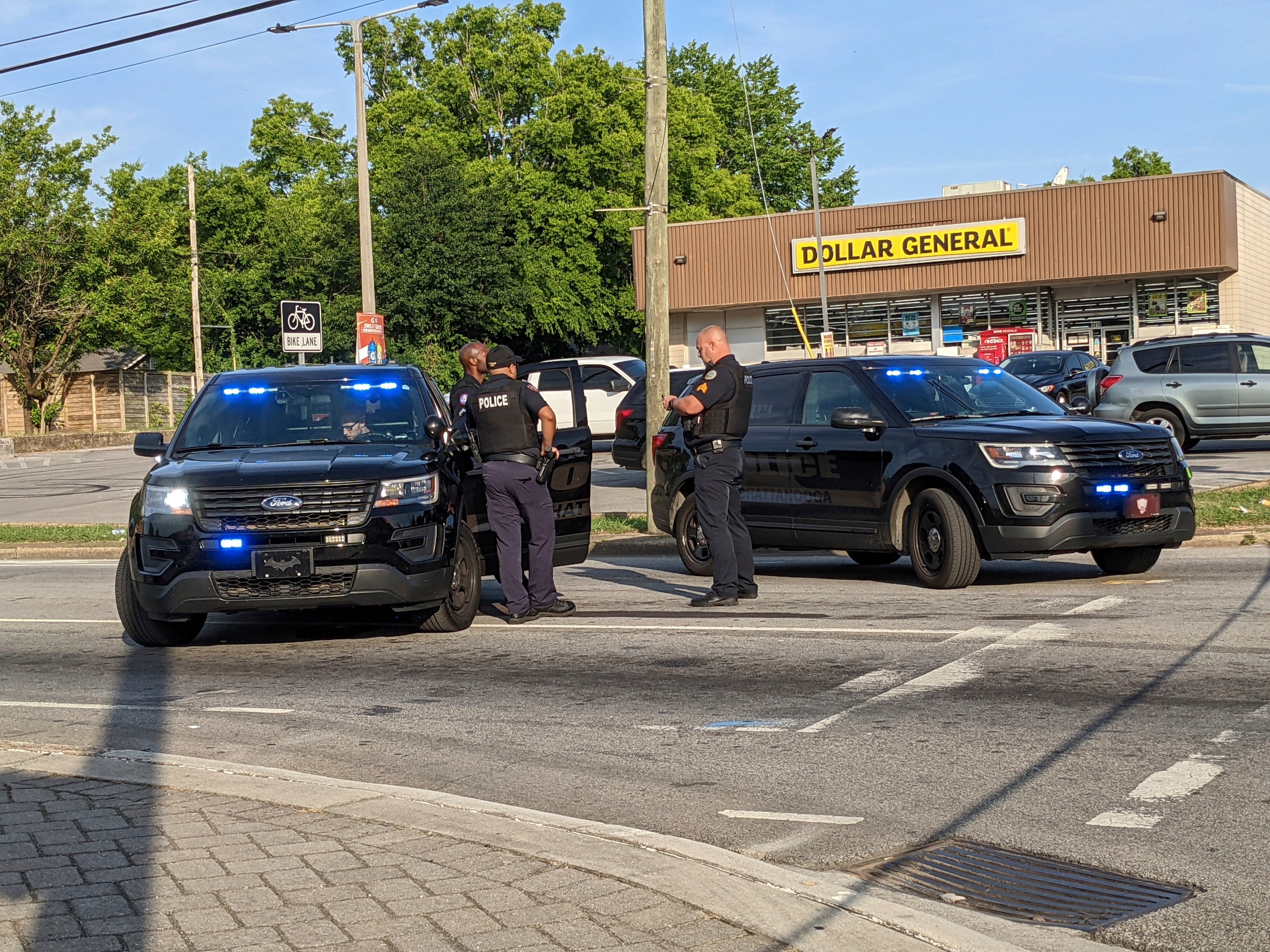
Following a string of horrific shootings around the US in recent weeks, a bipartisan group of senators said they have never been more “serious” about stopping the country’s gun violence epidemic.
“I’ve never been part of negotiations as serious as these,” Democrat Chris Murphy of Connecticut said on Sunday. “There are more Republicans at the table talking about changing our gun laws and investing in mental health than at any time since Sandy Hook.”
Action can’t come soon enough after at least 10 people were killed and 49 injured across seven different mass shootings in the last 48 hours and calls for change intensify across the country.
In the early hours on Sunday, three were killed and 14 injured outside a bar in Chattanooga, Tennessee. One of the victims was hit by a car fleeing the chaos. The shooting happened just over a week after another gun incident in the city wounded six teenagers.
In Mesa, Arizona, another two people were killed and two injured on Sunday morning at a nightclub parking lot shooting.
One person was killed and seven people, many of them teenagers, were injured during a suspected drive-by shooting at a graduation party in Summerton, South Carolina earlier on Saturday night.
“Senseless acts won’t be tolerated. There’s absolutely no reasoning whatsoever for things like this to be happening,” Sheriff Tim Baxley said after the shooting. “This was a school graduation party and you’ve got all these innocent children that were there that were hit by gunfire.”
On that same night, in Philadelphia, police believe multiple shooters killed three people and injured 11 as shots rang out in the city’s South Street district, a popular area filled with bars and restaurants.

“We cannot accept continued violence as a way of life in our country,” Philadelphia mayor Jim Kenney said. “Until we address the availability and ease of access to firearms, we will always be fighting an uphill battle.”
In Macon, Georgia, a 19-year-old was shot and killed, and three more were hospitalised in an incident at an abandoned house.
And in eerie echo of past shootings, another graduation party, this one in Socorro, Texas, was shot up on Saturday, wounding five teenagers and traumatising the nearly 100 children inside the house where it occurred.
“Another shooting. How many, how much is it gonna take?” a town resident told KFOX.
As grave and tragic as these incidents are, they are hardly exceptional in America.
There’s more than one mass shooting a day on average in the US and data suggests they have been on the rise for the last three years.
Still, those like Senator Murphy are hoping the seemingly nonstop gun tragedies of recent months have refocused Washington on passing gun reform, years after many made promises to do so after the Sandy Hook massacre and Columbine killings.
“We’re not going to put a piece of legislation on the table that’s going to ban assault weapons, or we’re not going to pass comprehensive background checks,” Mr Murphy told CNN’s State of the Union. “But right now, people in this country want us to make progress. They just don’t want the status quo to continue for another 30 years.”
The Connecticut senator said instead that investments in school security and expanded mental health treatment could still be on the table.
He’s part of a bipartisan group including Richard Blumenthal (D-Conn), Bill Cassidy (R-La), Susan Collins (R-Maine), Lindsey Graham (R-SC), Martin Heinrich (D-NM), Joe Manchin (D-WV), Kyrsten Sinema (D-AZ) and Pat Toomey (R-PA) working on gun-related reforms.

But with a 50-50 deadlock in the Senate, anything more sweeping is hard to imagine.
Senator John Cornyn of Texas, appointed by minority leader Mitch McConnell to help conduct gun talks across the aisle, told a conservative radio host from Texas this week that any major restrictions on the Second Amendment are “not gonna happen”.
He has long been tempering expectations on any major reforms after the Uvalde massacre.
“I’m not interested in making a political statement,” he said. “I’m actually interested in what we can do to make the terrible events that occurred in Uvalde less likely in the future.”
Things have proved just as contentious in the House, where Democrats passed a six-bill suite of gun reforms through the key Judiciary Committee, teeing up one of the most substantial changes to gun laws in decades.
The so-called Protecting Our Kids Act would raise the minimum age requirement to buy a semi-automatic rifle, ban high-capacity ammunition magazines and ghost gun kits, require safe gun storage and up the penalties for illegal gun sales.
The bill is unlikely to pass the Senate, and even in the lower House, as many in the GOP are voicing their opposition.
Florida Republican Greg Steube held up four different guns as he called in via video to a gun hearing in the House this week.
“Here’s a gun I carry every single day to protect myself, my family, my wife, my home,” the congressman said, eliciting shock and outrage from his Democratic colleagues.
Jim Jordan, the top Republican on the judiciary committee, has also accused Democrats of authoring a “rushed” gun-control agenda “in what seems more like political theatre than a real attempt at improving public safety”.
The gridlock continues even as Joe Biden has ramped up calls for a major change to public safety in the US.
During a speech on Thursday from the White House, against a backdrop of flickering memorial candles, he pointed to data showing guns are the number one killer of children in the US.
According to the CDC, more school-age children have died from guns than on-duty police officers and active-duty military members combined.

“Think about that. More kids than on-duty cops killed by guns. More kids than soldiers killed by guns. For God’s sake. How much more carnage are we willing to accept?” he said. “How many more innocent American lives must be taken before we say enough? Enough.”
Some Democratic states have heeded this call, though Texas leaders have sworn off new gun control.
On Thursday, New York passed a package of gun laws strengthening the state’s red flag process, adding an additional permit to own a rifle and raising the minimum age requirement to buy a semi-automatic assault rifle.
California, meanwhile, is fast-tracking proposals to ban gun shows on private properties, require reporting on shooting threats and education on safe gun storage in schools and deputise private citizens to sue gun sellers and illegal gun distributors tied to crimes.
New Jersey and Delaware are also considering expanded registration and safe storage requirements for guns.
Those touched by May and June’s shootings are calling on leaders not to be complacent this time.
“We cannot sit here today and cry for Geraldine and not make sure justice is done for Geraldine,” civil rights leader Al Sharpton said at the memorial service for Geraldine Talley, a 62-year-old killed in the white supremacist shooting in Buffalo.
Erika Santiago of Uvalde, while attending the funeral of victim Amerie Jo Garza, said her son doesn’t want to go to school now.
“He told me he did not want to go to school fearing that could happen,” Ms Santiago told The Associated Press. “He told me, ‘Mom, I just don’t feel safe.’”
It’s a call for change that shows few signs of abating.
On 8 June, Miah Cerillo, an 11-year-old who survived the Uvalde shooting by smearing a deceased classmate’s blood over her body and playing dead, will testify before Congress.
Her parents have set up a GoFundMe to pay for therapy for their daughter, who they say is losing hair in clumps, not sleeping and being set off by loud noises like car alarms.
All around the country, the healing process is beginning after these shootings, but whether broken US institutions that allowed such violence to occur can heal, remains to be seen.







